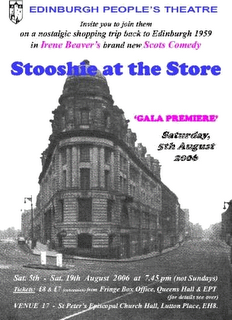With reference to the discussion on
Scavella’s blog and to
this discussion at Word Doctors, it’s not always easy to determine what marks the difference between poetry and prose. Have a look at the following three pieces, each set out as prose and as poetry, and guess whether the ‘prose version’ or the ‘poetry version’ is the real one. Feel free to leave answers in the comments box.
(If you recognise the pieces, and know the correct answer on account of that, don’t give the game away.) After a few days, I'll give you the answers and say who wrote what.
1.
A)
This – according to the voice on the radio, the host of a classical music program no less – this is the birthday of Vivaldi. He would be 325 years old today, quite bent over, I would imagine, and not able to see much through his watery eyes. Surely he would be deaf by now, the clothes flaking off him, hair pitiably sparse.
But we would throw a party for him anyway, a surprise party where everyone would hide behind the furniture to listen for the tap of his cane on the pavement and the sound of his dry, persistent cough.
*
B)
This –
according to the voice on the radio,
the host of a classical music program no less –
this is the birthday of Vivaldi.
He would be 325 years old today,
quite bent over, I would imagine,
and not able to see much through his watery eyes.
Surely he would be deaf by now,
the clothes flaking off him,
hair pitiably sparse.
But we would throw a party for him anyway,
a surprise party where everyone
would hide behind the furniture to listen
for the tap of his cane on the pavement
and the sound of his dry, persistent cough.
***
2.
A)
How rare these things are! To share the day with you – to people the earth. Whether to have a god or a goddess for companion in your walks, or to walk alone with hinds and villains and carles. Would not a friend enhance the beauty of the landscape as much as a deer or hare? Everything would acknowledge and serve such a relation; the corn in the field, and the cranberries in the meadow. The flowers would bloom and the birds sing, with a new impulse. There would be more fair days to us in the year.
The object of love expands and grows before us to eternity, until it includes all that is lovely, and we become all that can love.
*
B)
How rare these things are!
To share the day with you –
to people the earth.
Whether to have a god or a goddess
for companion in your walks,
or to walk alone
with hinds and villains and carles.
Would not a friend enhance
the beauty of the landscape
as much as a deer or hare?
Everything would acknowledge
and serve such a relation;
the corn in the field,
and the cranberries in the meadow.
The flowers would bloom
and the birds sing,
with a new impulse.
There would be more fair days
to us in the year.
The object of love expands
and grows before us to eternity,
until it includes all that is lovely,
and we become all that can love.
***
3.
A)
Years after my mother chose emptiness, at night I’d hear her at the piano planting chords, waiting for them to grow into something. She never advanced from childhood lessons. She’d crackle flat a dry page of Bartok or Anna Magdalena and make the house’s spine grow cold.
That was all her hesitant handfuls conjured – misery, a lonely beginner always beginning again, a weather of notes I wished would pass. They trickled onto my sheets in the dark, each drop telling how sad a woman could feel even to have lost what made her sad.
B)
Years after my mother chose emptiness
at night I’d hear her at the piano
planting chords, waiting for them
to grow into something.
She never advanced from childhood
lessons. She’d crackle flat a dry page
of Bartok or Anna Magdalena
and make the house’s spine grow cold.
That was all her hesitant handfuls
conjured – misery, a lonely beginner
always beginning again, a weather
of notes I wished would pass.
They trickled onto my sheets
in the dark, each drop telling
how sad a woman could feel
even to have lost what made her sad.
The answers are in the comments box. Here are the citations:
Number 1 is
Surprise by Billy Collins from his collection,
Nine Horses (Picador, 2002)
Number 2 is an excerpt from Henry David Thoreau’s
Letters to a Spiritual Seeker (Norton 2006)
Number 3 is
Piano Solo by Henry Shukman, from his collection,
Doctor No’s Garden (Cape, 2002)



